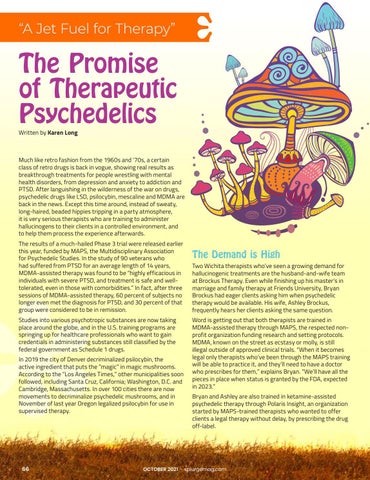“A Jet Fuel for Therapy”
The Promise of Therapeutic Psychedelics Written by Karen Long
Much like retro fashion from the 1960s and ‘70s, a certain class of retro drugs is back in vogue, showing real results as breakthrough treatments for people wrestling with mental health disorders, from depression and anxiety to addiction and PTSD. After languishing in the wilderness of the war on drugs, psychedelic drugs like LSD, psilocybin, mescaline and MDMA are back in the news. Except this time around, instead of sweaty, long-haired, beaded hippies tripping in a party atmosphere, it is very serious therapists who are training to administer hallucinogens to their clients in a controlled environment, and to help them process the experience afterwards. The results of a much-hailed Phase 3 trial were released earlier this year, funded by MAPS, the Multidisciplinary Association for Psychedelic Studies. In the study of 90 veterans who had suffered from PTSD for an average length of 14 years, MDMA-assisted therapy was found to be “highly efficacious in individuals with severe PTSD, and treatment is safe and welltolerated, even in those with comorbidities.” In fact, after three sessions of MDMA-assisted therapy, 60 percent of subjects no longer even met the diagnosis for PTSD, and 30 percent of that group were considered to be in remission. Studies into various psychotropic substances are now taking place around the globe, and in the U.S. training programs are springing up for healthcare professionals who want to gain credentials in administering substances still classified by the federal government as Schedule 1 drugs. In 2019 the city of Denver decriminalized psilocybin, the active ingredient that puts the “magic” in magic mushrooms. According to the “Los Angeles Times,” other municipalities soon followed, including Santa Cruz, California; Washington, D.C. and Cambridge, Massachusetts. In over 100 cities there are now movements to decriminalize psychedelic mushrooms, and in November of last year Oregon legalized psilocybin for use in supervised therapy.
66
The Demand is High Two Wichita therapists who’ve seen a growing demand for hallucinogenic treatments are the husband-and-wife team at Brockus Therapy. Even while finishing up his master’s in marriage and family therapy at Friends University, Bryan Brockus had eager clients asking him when psychedelic therapy would be available. His wife, Ashley Brockus, frequently hears her clients asking the same question. Word is getting out that both therapists are trained in MDMA-assisted therapy through MAPS, the respected nonprofit organization funding research and setting protocols. MDMA, known on the street as ecstasy or molly, is still illegal outside of approved clinical trials. “When it becomes legal only therapists who’ve been through the MAPS training will be able to practice it, and they’ll need to have a doctor who prescribes for them,” explains Bryan. “We’ll have all the pieces in place when status is granted by the FDA, expected in 2023.” Bryan and Ashley are also trained in ketamine-assisted psychedelic therapy through Polaris Insight, an organization started by MAPS-trained therapists who wanted to offer clients a legal therapy without delay, by prescribing the drug off-label.
OCTOBER 2021 · splurgemag.com
